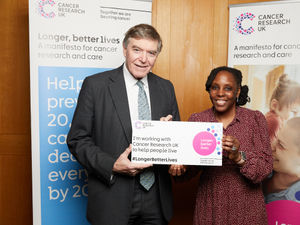King Charles diagnosis 'shows how cancer can affect any of us' - Shropshire MP
A Shropshire MP has met a cancer charity's staff to discuss how to speed up progress in preventing, diagnosing and treating the disease.

Philip Dunne will step down as MP for Ludlow (the constituency will become South Shropshire) at the upcoming General Election but the former health minister was keen to mark the recent World Cancer Day at a special Cancer Research UK event at Westminster.
He also mentioned the announcement that King Charles is facing cancer.
Mr Dunne said: “There has been real progress in the fight against cancer and survival in the UK has doubled in the last 50 years. But there’s still much further to go.
"His Majesty’s diagnosis only last week has sadly brought into focus how cancer can affect any of us.
"While I am retiring as an MP at the next General Election, I know people in South Shropshire could benefit hugely from the proposals in Cancer Research UK’s manifesto and its vital mission to help avoid 20,000 cancer deaths a year in the UK by 2040.”
The event on February 4 focussed on improving cancer survival in the UK where nearly one in every two people will get cancer in their lifetime.
Developed with insights from cancer patients and experts from across health, life sciences, government and academic sectors, the charity has recently published an ambitious cancer plan: Longer, better lives: a manifesto for cancer research and care.
It sets out a raft of key measures that, if adopted in the UK, could help avoid 20,000 cancer deaths a year by 2040.
Recommendations in the manifesto include the introduction of measures to end cancers caused by smoking, such as the proposed legislation to raise the age of sale of tobacco products; improved early detection of cancer through initiatives including a lung screening programme; greater investment in research; and action to ensure cancer wait time targets are met.
Last week, the Government announced £10m funding as part of the radical new programme called the Innovative Devices Access Pathway (IDAP), which aims to bring state-of-the-art technologies and solutions to fight cancer at the forefront of the NHS.
Currently in the pilot stage, the funding will be used to test the new technologies for use on a large scale as quickly as possible.




